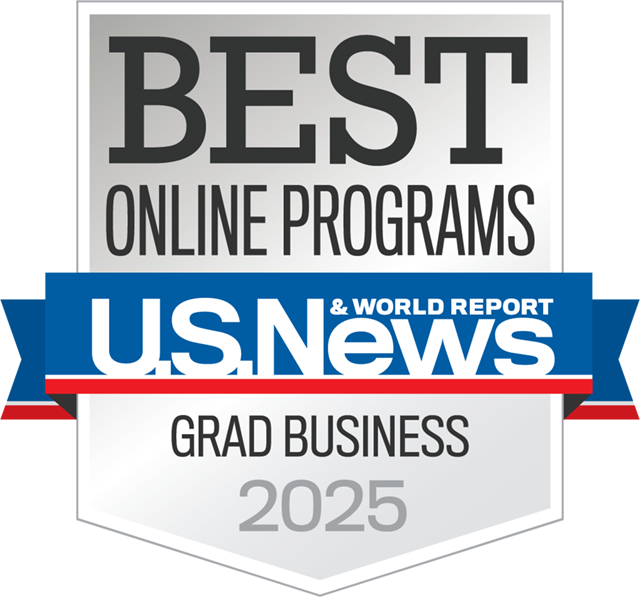100% Online
Complete your Penn State course work at your own pace and 100% online.
Application deadline
Credits and costs
Nationally Recognized

Gain Skills to Become a CPA with a Master of Professional Accounting Degree
Leverage an expanded accounting knowledge base to become an effective, efficient accounting professional.
Build the technical expertise and confidence needed to adapt to increasingly complex business methods, growing sophistication in auditing approaches, new tax laws, and demand for highly technical services.
Successfully prepare for the CPA exam and gain the academic credentials needed for licensure as a CPA.
Understand business processes, transaction cycles, and internal control structures of computerized accounting information systems.
Your Online Professional Accounting Courses
Your Online Professional Accounting Courses
You will take 10 online courses in this comprehensive 30-credit master's in accounting program. The curriculum is carefully designed to include courses that explicitly address the content critical to your successful preparation for the CPA exam.
Your final capstone course (ACCTG 803) will integrate material you learned in the preceding advanced financial accounting courses and, through case studies, will focus on investigative accounting, consulting, and litigation support activities that you undertake in forensic accounting engagements.
Required Courses (27 credits)
- 3credits
Auditing theory pertaining to the regulatory environment, risk assessment, internal controls, materiality, computerization, analytical procedures, sampling, fraud, ethics, and professional responsibilities.
- 3credits
Tax theory pertaining to corporations, partnerships and conduit entities, estates, trusts, ethics, and professional tax responsibilities.
- 3credits
The study of business processes, transactions cycles, and internal control structure with an emphasis on computerized accounting information systems.
- 3credits
Current managerial accounting topics such as activity-based costing, theory of constraints, and performance measures and their use in organizations.
- 3credits
The study of ethical systems and ethical decision-making and their application in accounting.
- 3credits
The exploration of conventional and advanced methods of analyzing financial statements, including earnings quality and financial distress assessment.
- 3credits
Accounting theory and practice for reporting consolidations, foreign currency transactions, and preparing financial statements for governmental and NGOs.
- 3credits
All articles of the Uniform Commercial Code, banking relationships, debtor-creditor law, and bankruptcy law.
- 3credits
Accounting, reporting, and auditing principles and procedures for public sector agencies and nonprofit organizations.
Capstone Course (3 credits)
- 3credits
Study of investigative accounting, consulting, and litigation support activities undertaken in forensic accounting engagements.
Course Availability
If you're ready to see when your courses will be offered, visit our public LionPATH course search (opens in new window) to start planning ahead.
Advance Your Career

Advance Your Career
The online Master of Professional Accounting degree and Penn State's career resources can prepare you for a career in auditing and public accounting, industrial and managerial accounting, and governmental and not-for-profit accounting.
Job Titles Related to This Degree
Becoming a Certified Public Accountant (CPA) opens doors to opportunities not only in accounting firms but also across the business landscape. Combining graduate accounting course work with CPA certification can facilitate your entry to careers in consulting and advisory services as well as corporate finance, financial analysis, and forensic accounting.
The following roles are often held by people with this type of degree:
- Accountant
- Accounting Officer
- Budget Analyst
- Budget Officer
- Internal Auditor
Employment Outlook for Occupational Fields Related to This Degree
Estimates of employment growth and total employment are provided by the U.S. Bureau of Labor Statistics and are subject to change. While these occupations are often pursued by graduates with this degree, individual outcomes may vary depending on a variety of factors. Penn State World Campus cannot guarantee employment in a given occupation.
Accountants and Auditors
Financial Examiners
Budget Analysts
Career Services to Set You Up for Success

From the day you're accepted as a student, you can access resources and tools provided by Penn State World Campus Career Services to further your career. These resources are beneficial whether you're searching for a job or advancing in an established career.
- Opportunities to connect with employers
- Career counselor/coach support
- Occupation and salary information
- Internships
- Graduate school resources
Ready to Learn More?
Get the resources you need to make informed decisions about your education. Request information on this program and other programs of interest by completing this form.
Ready to take the next step toward your Penn State master's degree?
Costs and Financial Aid
Costs and Financial Aid
Learn about this program's tuition, fees, scholarship opportunities, grants, payment options, and military benefits.
Costs and Financial Aid
Graduate Tuition
Graduate tuition is calculated based on the number of credits for which you register. Tuition is due shortly after each semester begins and rates are assessed every semester of enrollment.
2024–25 Academic Year Rates
| How many credits do you plan to take per semester? | Cost |
|---|---|
| 11 or fewer | $1,027 per credit |
| 12 or more | $12,325 per semester |
2025–26 Academic Year Rates
| How many credits do you plan to take per semester? | Cost |
|---|---|
| 11 or fewer | $1,037 per credit |
| 12 or more | $12,448 per semester |
Financial Aid and Military Benefits
Some students may qualify for financial aid. Take the time to research financial aid, scholarships, and payment options as you prepare to apply. Federal financial aid may only be used to pay for credits used to satisfy program requirements.
Military service members, veterans, and their spouses or dependents should explore these potential military education benefits and financial aid opportunities, as well.
Additional Cost of Attendance Details
To view the detailed list of cost of attendance elements:
- visit the Tuition Information site
- click the plus sign to expand the table
- select a semester from the World Campus row
Technical Requirements
Review the technical requirements for this program.
Earn a Valuable Credential along the Way

Earn a Valuable Credential along the Way
Show mastery of specific subjects before your degree is complete. Thanks to shared courses across accounting programs, students can often earn a certificate along with their degree in less time than if they earned them separately.
Certificate Programs Related to This Degree
If you apply and are accepted to the master's degree program, you can apply the 12 credits from the certificate toward the degree. The more fundamental Graduate Certificate in Accounting Foundations may provide some of the necessary prerequisite course work for the master’s degree; however, credit from this program cannot be applied to meet graduation requirements for the Master of Professional Accounting.
Master topics in auditing theory, tax planning, cost management, financial statement analysis, and reporting for government or nonprofit entities as you prepare for CPA licensure through this online certificate program.
Learn more about the Graduate Certificate in AccountingWho Should Apply?
Who Should Apply?
If you have completed an undergraduate degree in business or accounting and need to satisfy the 150-credit hour educational requirements for CPA licensure in Pennsylvania and most other states, this online master's degree in accounting is designed for you.
Admission to the Master of Professional Accounting online program does not require an undergraduate accounting degree, but it does require certain undergraduate accounting courses. Prerequisite accounting courses are listed with the How to Apply information.
AACSB Accredited

The School of Business Administration carries the elite AACSB accreditation, an honor reserved for the top 5% of business schools worldwide.
Set Your Own Pace

Set Your Own Pace
Whether you are looking to finish your program as quickly as possible or balance your studies with your busy life, Penn State World Campus can help you achieve your education goals. Many students take one or two courses per semester.
Our online courses typically follow a 12- to 15-week semester cycle, and there are three semesters per year (spring, summer, and fall). If you plan to take a heavy course load, you should expect your course work to be your primary focus and discuss your schedule with your academic adviser.
To Finish Your Degree in Two and a Half Years
- Take 2 courses each semester
To Finish Your Degree in Three Years
- Take 1 course each semester
Timelines may vary based on course availability.
Convenient Online Format
This program's convenient online format gives you the flexibility you need to study around your busy schedule. You can skip the lengthy commute without sacrificing the quality of your education and prepare yourself for more rewarding career opportunities without leaving your home.
A Trusted Leader in Online Education

Penn State has a history of more than 100 years of distance education, and World Campus has been a leader in online learning for more than two decades. Our online learning environment offers the same quality education that our students experience on campus.
Information for Military and Veterans

Are you a member of the military, a veteran, or a military spouse? Please visit our military website for additional information regarding financial aid, transfer credits, and application instructions.
Professional Licensure / Certification
Professional Licensure / Certification
Qualify for a CPA certificate and license to practice public accounting.
How to Earn the CPA Licensure
- Meet the 150-credit hour education requirement for entry into the accounting profession. Graduates of the Bachelor of Science in Accounting degree will earn a minimum of 120 credit hours.
- Pass the Uniform CPA Examination to qualify for a CPA certificate and license (i.e., permit to practice) to practice public accounting.
Keep in mind...
- The exam is the same no matter where it is taken, but every state/jurisdiction has its own set of education and experience requirements that individuals must meet.
- If you plan to pursue employment in a licensed profession, remember that completion of this program alone does not meet the requirements for licensure.
- You can visit our Professional Licensure/Certification Disclosures by State interactive map to learn more about the requirements in each state.
Pennsylvania CPA and Licensing Requirements
For more details on the CPA Exam and licensing requirements in the state of Pennsylvania, visit the Penn State Harrisburg website.
How to Apply to Penn State

How to Apply to Penn State
Apply by October 1 to start January 12
Application Instructions
Deadlines and Important Dates
Complete your application and submit all required materials by the appropriate deadline. Your deadline will depend on the semester you plan to start your courses.
Spring Deadline
Apply by October 1 to start January 12Summer Deadline
Apply by February 1 to start May 18Fall Deadline
Apply by June 1, 2026, to start August 24, 2026
Steps to Apply
For admission to the J. Jeffrey and Ann Marie Fox Graduate School, an applicant must hold either (1) a baccalaureate degree from a regionally accredited U.S. institution or (2) a tertiary (postsecondary) degree that is deemed comparable to a four-year bachelor's degree from a regionally accredited U.S. institution. This degree must be from an officially recognized degree-granting institution in the country in which it operates.
If CPA licensure is your goal, please verify your state's rules and requirements. See the State Regulations for more information.
Prerequisites — Please be sure you have the required prerequisite courses. If your undergraduate degree is not in accounting, you should have completed or be in the process of taking the following minimum core of accounting course work (or its equivalent) prior to submitting your application:
- ACCTG 211: Financial and Managerial Accounting for Decision-Making (generally Principles of Accounting I, covering financial accounting, and Principles of Accounting II, covering managerial accounting, at other universities)
- ACCTG 310: Federal Taxation I (covering individual taxation) — ACCTG 211 is a prerequisite for this course.
- ACCTG 340: Cost Accounting — ACCTG 211 is a prerequisite for this course.
- ACCTG 471: Intermediate Financial Accounting I — ACCTG 211 is a prerequisite for this course.
- ACCTG 472: Intermediate Financial Accounting II — ACCTG 471 is a prerequisite for this course.
- ACCTG 403: Auditing — ACCTG 471 is a prerequisite for this course.
If you have previously taken undergraduate accounting courses and need advice on the specific undergraduate courses you still need for the Master of Professional Accounting program, send your unofficial transcript to [email protected] with your request for assistance.
GPA — GPA from the final two years of undergraduate studies is required.
You will need to upload the following items as part of your application:
Official transcripts from each institution attended, regardless of the number of credits or semesters completed. Transcripts not in English must be accompanied by a certified translation. If you are a Penn State alum, you do not need to request transcripts for credits earned at Penn State but must list Penn State as part of your academic history.
Test Scores — GRE and GMAT scores are NOT required.
English Proficiency — The language of instruction at Penn State is English. With some exceptions, international applicants must take and submit scores for the Test of English as a Foreign Language (TOEFL) or International English Language Testing System (IELTS). Minimum test scores and exceptions are found in the English Proficiency section on the Fox Graduate School's "Requirements for Graduate Admission" page. Visit the TOEFL website for testing information. Penn State's institutional code is 2660.
References (2) — You will need to initiate the process through the online application by entering names, email addresses, and mailing addresses of two references. Upon submission of your application, an email will be sent to each reference requesting they complete a brief online recommendation regarding your commitment for success in an online program. Please inform all recommenders they must submit the form in order for your application to be complete.
Program-Specific Questions/Materials
Résumé — Upload a one- to two-page résumé highlighting your full-time employment and/or military experience to the online application.
To begin the online application, you will need a Penn State account.
Create a New Penn State Account
If you have any problems during this process, contact an admissions counselor at [email protected].
Please note: Former Penn State students may not need to complete the admissions application or create a new Penn State account. Please visit our Returning Students page for instructions.
You can begin your online application at any time. Your progress within the online application system will be saved as you go, allowing you to return at any point as you gather additional information and required materials.
- Choose Enrollment Type: "Degree Admission"
- Choose "WORLD CAMPUS" as the campus
Checking Your Status
You can check the status of your application by using the same login information established for the online application form.5. Complete the application.
Admissions Help
If you have questions about the admissions process, contact an admissions counselor at [email protected].
Contact Us

Contact Us
Have questions or want more information? We're happy to talk.
To learn more about the Master of Professional Accounting, contact:
For general questions or questions regarding how to apply, contact:
World Campus Admissions Counselors
Phone: 814-863-5386
[email protected]
For questions regarding your submitted application, contact:
Sherri Harkins
Administrative Support
Master of Professional Accounting
Phone: 717-948-6008
[email protected]
For questions regarding program curriculum, contact:
Seung Won Lee, Ph.D., CPA, CFA, CMA
Assistant Professor of Accounting
Master of Professional Accounting Program
Phone: 717-948-6483
[email protected]
Learn from the Best
Learn from the Best
The master's in accounting program, offered in partnership with the Penn State Harrisburg School of Business Administration, is developed and taught by experienced full-time Penn State faculty with diverse backgrounds.
Faculty
Thomas T. Amlie
- DegreePh.D., Accounting, University of Maryland
- DegreeMBA, University of Maryland
Dr. Thomas T. Amlie's teaching interests are in the area of financial accounting and reporting. His research interests center on the proper disclosure of accounting information, the assumptions underlying that accounting information, and the effects of those assumptions on business decisions and reporting.
Charles A. (Chuck) Brown
- DegreePh.D., Accounting, Kent State University
- DegreeMBA, Finance, Kent State University
- DegreeB.S.; B.A., Accounting, Slippery Rock University
Dr. Chuck A. Brown teaches undergraduate intermediate and cost accounting and graduate strategic cost management. He was the 2020 recipient of the Milton S. Eisenhower Award for Distinguished Teaching. He has previous auditing experience in real estate development, steel fabrication, thoroughbred horse racing tracks, and not-for-profit organizations. His research interests include applied managerial accounting studies, accounting education issues, and NCAA budgeting studies. He is Penn State Behrend's faculty athletics representative and has served on numerous NCAA committees at the national level.
Patrick Cusatis
- DegreePh.D., Finance, Penn State
- DegreeB.S., Finance, Penn State
Dr. Patrick Cusatis, CFA, is an associate professor of finance. Prior to joining Penn State, he was an institutional portfolio manager at CoreStates National Bank, First Union National Bank, and Tucker Anthony. Prior to that, he was an investment banker at Lehman Brothers in New York City, specializing in new product development. His research interests include corporate restructuring, portfolio management, derivative securities, and municipal bonds.
Ashutosh Deshmukh
- DegreePh.D., Accounting, University of Memphis
- DegreeMBA, Finance, University of Alabama
- DegreeDCM, Computer Programming, University of Mumbai
- DegreeB.S., Chemistry, University of Mumbai
- DegreeProfessional Certifications: CPA, ACA, CFE, CMA, CISE
Dr. Ashutosh Deshmukh is a professor of accounting and MIS at Penn State Behrend. He holds certification in public accounting, information systems auditing, management accounting, and fraud examination, and he has served as an expert witness in the U.S. House of Representatives, estimating the potential for fraud, waste, and abuse of grant money awarded over a five-year period by the U.S. EPA. He is the associate editor of the International Journal of Accounting, Auditing, and Performance Evaluation and the author of the book Digital Accounting: The Effects of the Internet and ERP on Accounting.
Renee Flasher
- DegreePh.D., Management with an Accounting concentration, Penn State
- DegreeM.S., Accounting, Case Western Reserve University
Dr. Renee Flasher's teaching interests are in the areas of forensic accounting, government/nonprofit accounting, and technology’s impacts on auditing and accounting. Her research interests center on the socially constructed nature of accounting and auditing (i.e., standard setting), along with enforcement mechanisms for professional behavior.
Bo Ouyang
- DegreePh.D., Accounting, University of Texas at Arlington
- DegreeMPA, University of Texas at Arlington
- DegreeB.A., English Education, Hunan Normal University, China
Bo Ouyang received his Ph.D. from the University of Texas at Arlington. Prior to joining Penn State Great Valley, he was an assistant professor in the accounting department at Texas A&M University-Corpus Christi. Dr. Ouyang teaches courses in financial accounting, managerial accounting, and financial statement analysis. His research interests include corporate governance, auditing, and corporate social responsibility. He has published his research at The Accounting Review, Review of Accounting Studies, Organization Science, and Accounting Horizons.
Richard Scheib
- DegreeJ.D., Widener University
- DegreeLL.M., Georgetown University
- DegreeB.S., Business Administration, Bloomsburg University
Richard Scheib is an instructor of law, tax, and accounting. Prior to teaching, and simultaneously with his consulting practice, he worked in private accounting for corporations, public accounting with Big Five accounting firms, state government, and large and small law firms handling a variety of both accounting and legal issues.
Haimeng Teng
DegreePh.D., Accounting, Rensselaer Polytechnic InstituteDr. Haimeng Teng has been a faculty member at Penn State Harrisburg since August 2019. She received her Ph.D from Rensselaer Polytechnic Institute. At Penn State Harrisburg, she has been teaching various accounting courses, including but not limited to federal taxation, accounting data analytics, accounting information systems, auditing, and financial statement analysis. She has published in top accounting and finance journals, including but not limited to The Journal of the American Taxation Association, Journal of Financial and Quantitative Analysis, and Journal of Corporate Finance.
Zachary Williams
- DegreeM.S., Professional Accounting, Penn State
- DegreeB.S., Accounting, Penn State
- DegreeB.S., International Business, Penn State
- DegreeB.S., Management Information Systems, Penn State
- DegreeB.S., Finance, Penn State
Zachary Williams is an assistant teaching professor at Penn State Behrend and integrates real-world experience from the public and private accounting sectors into the classroom. At Behrend, he teaches a range of undergraduate courses, including technology lab, introductory accounting, cost accounting, and forensic accounting. At the graduate level, he teaches forensic accounting and has previously taught financial statement analysis. He holds CPA, CMA, and CFE designations. His research interests focus on exploring how technology shapes financial decision-making and analysis.
News

